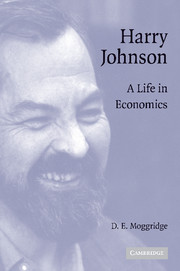Book contents
- Frontmatter
- Contents
- Photographs and Drawings
- HARRY JOHNSON
- Introduction
- 1 Toronto
- 2 Antigonish
- 3 England
- 4 North American Postgraduate
- 5 Cambridge Don
- 6 Cambridge Economist
- 7 Manchester
- 8 Chicago
- 9 Canada, Economic Nationalism, and Opulence, 1957–1966
- 10 Chicago: Money, Trade, and Development
- 11 LSE
- 12 Professional Life – Largely British
- 13 Money and Inflation
- 14 The International Monetary System
- 15 Harry's “Wicksell Period”
- 16 Stroke and After
- 17 Conclusion
- Sources
- Index
- Plate section
14 - The International Monetary System
Published online by Cambridge University Press: 04 December 2009
- Frontmatter
- Contents
- Photographs and Drawings
- HARRY JOHNSON
- Introduction
- 1 Toronto
- 2 Antigonish
- 3 England
- 4 North American Postgraduate
- 5 Cambridge Don
- 6 Cambridge Economist
- 7 Manchester
- 8 Chicago
- 9 Canada, Economic Nationalism, and Opulence, 1957–1966
- 10 Chicago: Money, Trade, and Development
- 11 LSE
- 12 Professional Life – Largely British
- 13 Money and Inflation
- 14 The International Monetary System
- 15 Harry's “Wicksell Period”
- 16 Stroke and After
- 17 Conclusion
- Sources
- Index
- Plate section
Summary
As we saw in Chapter 10, before Harry went to LSE he had been actively involved in discussions of the problems and prospects of the international monetary system. During his LSE period the Bretton Woods system collapsed after a series of crises and began to evolve into the system we know. Major developments since his death have been the liberalisation of international capital flows and the achievement of monetary union among members of the European Union, the creation of the European Central Bank, and the introduction of the Euro.
The month before Harry joined LSE, he attended a conference in Chicago. The conception of the conference, if one believes the published proceedings, was jointly his and Robert Mundell's (Mundell and Swoboda 1969, ix, 394). Later Harry attributed its origins to Mundell alone (1982, 86). The organisation of the conference departed markedly from that of the series of Bellagio meetings discussed in Chapter 10. First, it concentrated on theoretical problems rather than on monetary reform, although the problems discussed had emerged in the context of the consideration of systemic reform. Second, in choosing paper-givers and discussants, the emphasis was on younger members of the profession, with older members, such as Gottfried Haberler, Roy Harrod, Fritz Machlup, Walter Salant, and Harry himself, serving as session chairs. As a result, “the papers incorporated much more serious new thinking than is characteristic of a conference dominated by seniority” (1982, 86).
- Type
- Chapter
- Information
- Harry JohnsonA Life in Economics, pp. 360 - 377Publisher: Cambridge University PressPrint publication year: 2008



